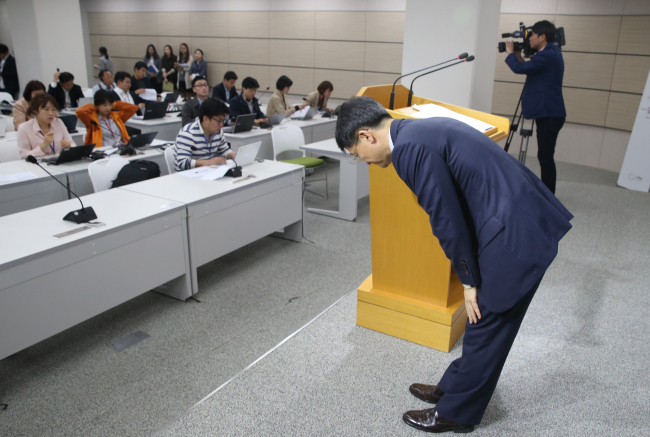Ministry’s survey on law schools fails to find nepotism
By Lee Hyun-jeongPublished : May 2, 2016 - 16:45
The Education Ministry has been conducting a nationwide survey on law schools since last year to find clues of “rampant nepotism” – which critics claim happens -- during the admission process. The ministry announced the results on Monday, but indicated they were able to only find mild cases that cannot be directly linked to any irregularities.
The ministry said it found a total of 24 cases in which law school applicants revealed the occupations or social positions of their parents, to allegedly take advantage of it in the admission process. Such information in five cases allowed the admission officials to identify their influential parents or relatives, officials said.
The ministry, however, stressed that clear causality between revealing the family background and the admission was not confirmed. The cancellation of the students’ admission is also impossible, citing that it is not appropriate to divert the accountability of schools’ mistakes to the students, it added.
The ministry said it found a total of 24 cases in which law school applicants revealed the occupations or social positions of their parents, to allegedly take advantage of it in the admission process. Such information in five cases allowed the admission officials to identify their influential parents or relatives, officials said.
The ministry, however, stressed that clear causality between revealing the family background and the admission was not confirmed. The cancellation of the students’ admission is also impossible, citing that it is not appropriate to divert the accountability of schools’ mistakes to the students, it added.

The probe was launched after a lawmaker was accused of allegedly using his authority to have his son admitted to a law school late last year. The ministry probed some 6,000 cases of the past three years. It was the first-ever probe since the law school system was introduced in 2009.
While Korean law schools have been welcomed as an alternative to widen opportunities to non-law major students and to raise diversity in the field, the admission system operated under schools’ discretion has sparked criticisms over their transparency.
Disallowing applicants from revealing their family background has been considered one of the tools to prevent nepotism.
The families of the applicants involved in the five cases were found to be high ranking officials of law firms, law-related organizations or high-ranking public servants.
Regardless of the results, the ministry said it will start mandating that schools conduct blind admission processes. Only 18 out of 25 law schools across the country have voluntarily applied strict rules against revealing family background of the applicants.
The Education Ministry also gave warnings to schools with lax admission rules.
Criticism, however, persists over the ministry’s “superficial” monitoring and light punishment against law schools.
While admission is mostly determined by bar scores, English test scores, personal essays and interviews, the schools are not obligated to disclose how much each criteria is weighed in the admission, allowing loopholes for schools to select student based on their preferences.
The nationwide probe, itself, also sparked criticism that it has caught irregularities only based on whether the students revealed their family backgrounds in their essays, overlooking irregularities in other areas.
The ministry, however, claimed that looking into the essays was the only objective way to probe the irregularities.
By Lee Hyun-jeong (rene@heraldcorp.com)
While Korean law schools have been welcomed as an alternative to widen opportunities to non-law major students and to raise diversity in the field, the admission system operated under schools’ discretion has sparked criticisms over their transparency.
Disallowing applicants from revealing their family background has been considered one of the tools to prevent nepotism.
The families of the applicants involved in the five cases were found to be high ranking officials of law firms, law-related organizations or high-ranking public servants.
Regardless of the results, the ministry said it will start mandating that schools conduct blind admission processes. Only 18 out of 25 law schools across the country have voluntarily applied strict rules against revealing family background of the applicants.
The Education Ministry also gave warnings to schools with lax admission rules.
Criticism, however, persists over the ministry’s “superficial” monitoring and light punishment against law schools.
While admission is mostly determined by bar scores, English test scores, personal essays and interviews, the schools are not obligated to disclose how much each criteria is weighed in the admission, allowing loopholes for schools to select student based on their preferences.
The nationwide probe, itself, also sparked criticism that it has caught irregularities only based on whether the students revealed their family backgrounds in their essays, overlooking irregularities in other areas.
The ministry, however, claimed that looking into the essays was the only objective way to probe the irregularities.
By Lee Hyun-jeong (rene@heraldcorp.com)










![[Hello India] Hyundai Motor vows to boost 'clean mobility' in India](http://res.heraldm.com/phpwas/restmb_idxmake.php?idx=644&simg=/content/image/2024/04/25/20240425050672_0.jpg&u=)








